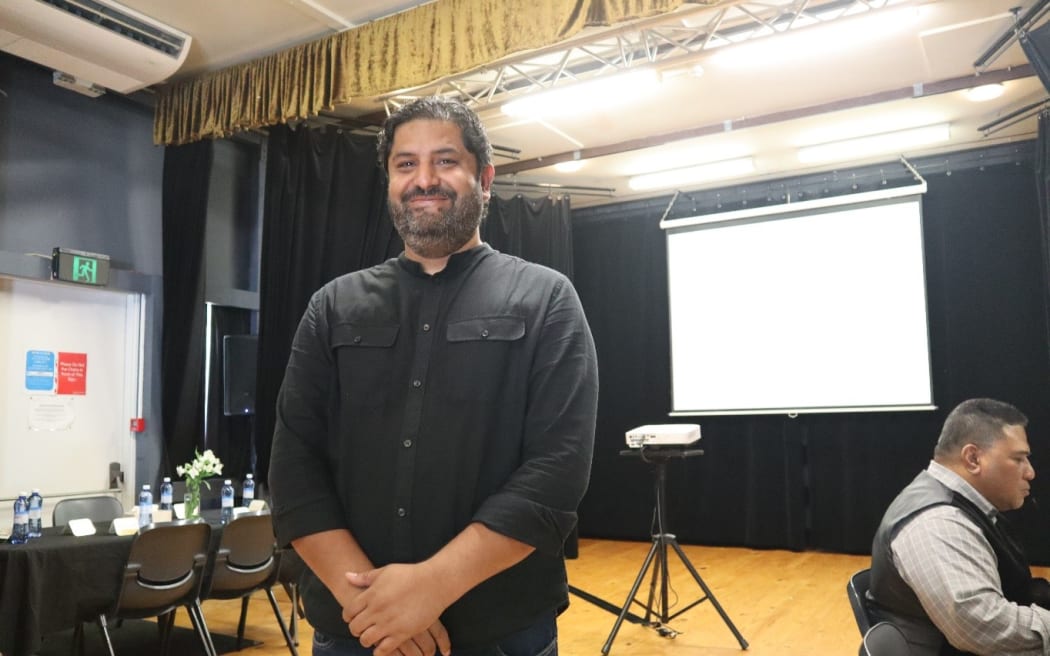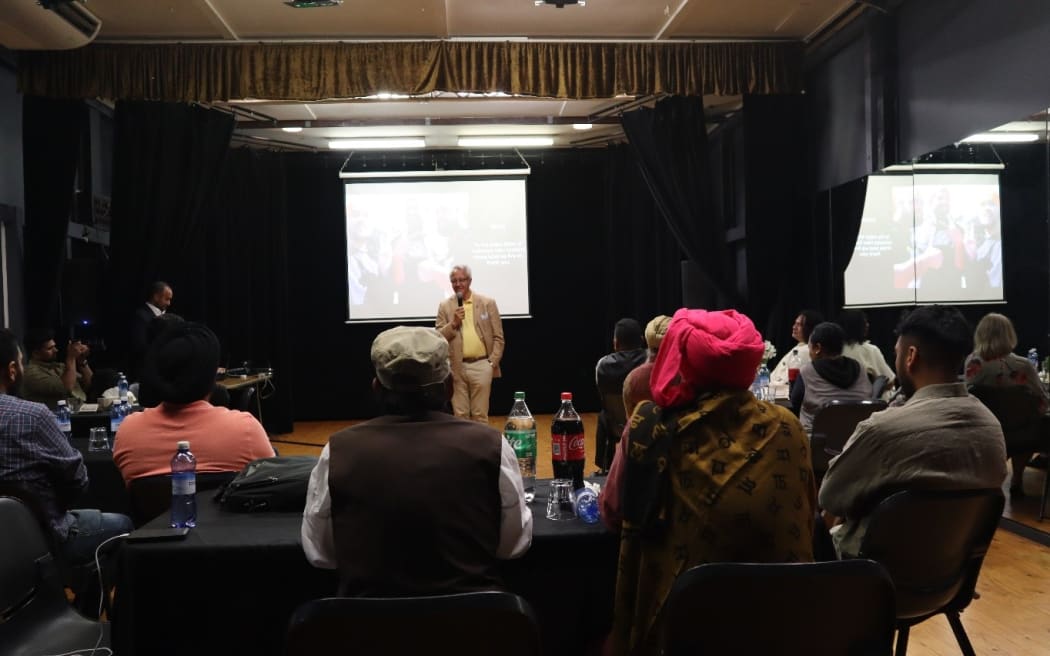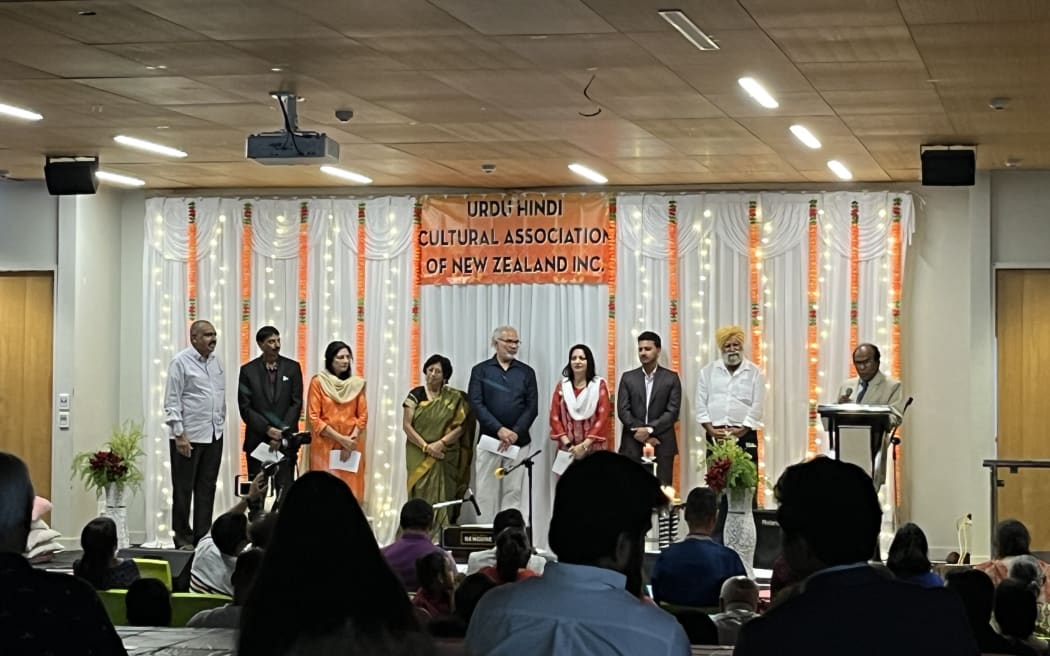
Asim Mukhtar's doctoral film Sanjha Punjab puts the spotlight on migrant Punjabis from India and Pakistan living in South Auckland. Photo: Supplied
A pair of recent community events have highlighted the shared culture and linguistic heritage that exists on the Indian subcontinent.
First, on 3 February, was the screening of a film by director Asim Mukhtar titled Sanjha Punjab, which shines a spotlight on migrant Punjabis from India and Pakistan now residing in South Auckland.
Then, on 10 February, the Urdu Hindi Cultural Association of New Zealand held its annual flagship poetry, spoken word and music event, featuring elements of mushaira, kavi sammelan and sham-e-ghazal.
Sanjha Punjab release
It took Mukhtar, a Punjabi filmmaker from Pakistan, four years to finish his doctoral film.
The documentary tells eight stories about the Punjabi community from India and Pakistan living in harmony in South Auckland.
"This (film) is about the community and, without the Punjabi community's support, making Sanjha Punjab would be impossible," Mukhtar says.
The stories delve into how migrant Punjabis from the subcontinent are mending their relationships after almost 80 years of being separated by a militarised border in their home countries.
In 1947, when India gained freedom from British rule, the subcontinent was divided into two independent nations: a Hindu-majority India and a Muslim-majority Pakistan.
This partition triggered one of the largest migrations in human history, with millions of Muslims moving to West and East Pakistan (present-day Pakistan and Bangladesh) and millions of Hindus and Sikhs migrating in the opposite direction. This event became known as the "partition of India".
The partition remains one of the darkest chapters in the history of India and Pakistan, resulting in the separation and displacement of numerous families, including communities in the Punjab region.

Sanjha Punjab is the first Punjabi-language film in New Zealand to be submitted as a doctoral project. Photo: RNZ / Blessen Tom
The film showcases typical Punjabi cultural activities, such as sharing poetry, attending places of worship, enjoying tea over conversation at Punjabi restaurants, singing folk and Sufi songs, performing traditional dances such as jhoomar and, for migrants, making return visits to Punjab.
Sanjha Punjab is the first Punjabi-language film in New Zealand to be submitted as a doctoral project.
The doctoral film is also the first to show the Indian Punjabi and Pakistani Punjabi communities in New Zealand living alongside each other, portraying everyday scenes of their shared culture, language and heritage being restored through friendly social interactions.
"This is a fascinating film and an amazing achievement," says AUT senior lecturer Teena Brown Pulu.
"It's the first Punjabi PhD to be produced in the mother tongue in the world and it came out from South Auckland," she says.
Before submitting his film and exegesis for examination, Mukhtar hosted a community screening for the cast and crew at Nathan Homestead in Manurewa on 3 February.
"Stories like this are important because often they're not showcased," says professor Pare Keiha, a pro vice-chancellor and dean at the Auckland University of Technology.
"[The story of the Punjabi community is] often untold or told by others and I suspect that, in telling stories, they're all stronger as a consequence," he says.
The film's cast includes more than 30 Punjabis, as well as members from the Tongan and Samoan communities, along with students from Government Islamia College in Chiniot, Punjab, Pakistan.
Mukhtar believes his film tells the world that Punjabis can live together without conflict or a militarised border.
"[Kiwi-Punjabis] are the ambassadors, and we will tell the rest of the world that we are living together peacefully," he says.
Mukhtar now intends to take his film to various film festivals around the world.
"We have already been selected for two film festivals and we are planning for a New Zealand launch too," he says.

The Urdu Hindi Cultural Association of New Zealand held its annual flagship poetry, spoken word and music event on 10 February, featuring elements of mushaira, kavi sammelan and sham-e-ghazal. Photo: RNZ / Gaurav Sharma
Words of wisdom
Meanwhile, the musical and literary evening organised by the Urdu Hindi Cultural Association of New Zealand featured 18 participants singing ghazal songs and reciting poetry.
"Our goal is to promote harmony between various communities of the Indian subcontinent, as well as preserve and promote the linguistic heritage of the two great languages coming from that part of the world: Urdu and Hindi," says association president Roopa Suchdev. "I believe these two languages are like sisters, with so much of shared origins and overlapping linguistic traits.
"But for the divide and rule policy of the British colonial rule, Urdu and Hindi could have been one language called Hindustani. Unfortunately, after the partition of India in 1947, languages were also in effect divided. Over time, Urdu came to be identified with Pakistan and Hindi with India."
Syed Mujeeb, secretary of the association, notes how his organisation is aiming to bridge that gap.
"We have members with origins in India, Pakistan, Bangladesh and even Sri Lanka," Mujeeb says. "Our annual magazine called Dhanak, whose latest edition was released on Saturday, provides a platform to local poets in Hindi, Urdu as well as Punjabi to get their work published and reach a wider audience.
"Every year, we also confer a lifetime achievement award to a local literary personality. This year, Hamilton-based Hindi poet Suman Kapoor was the recipient."



